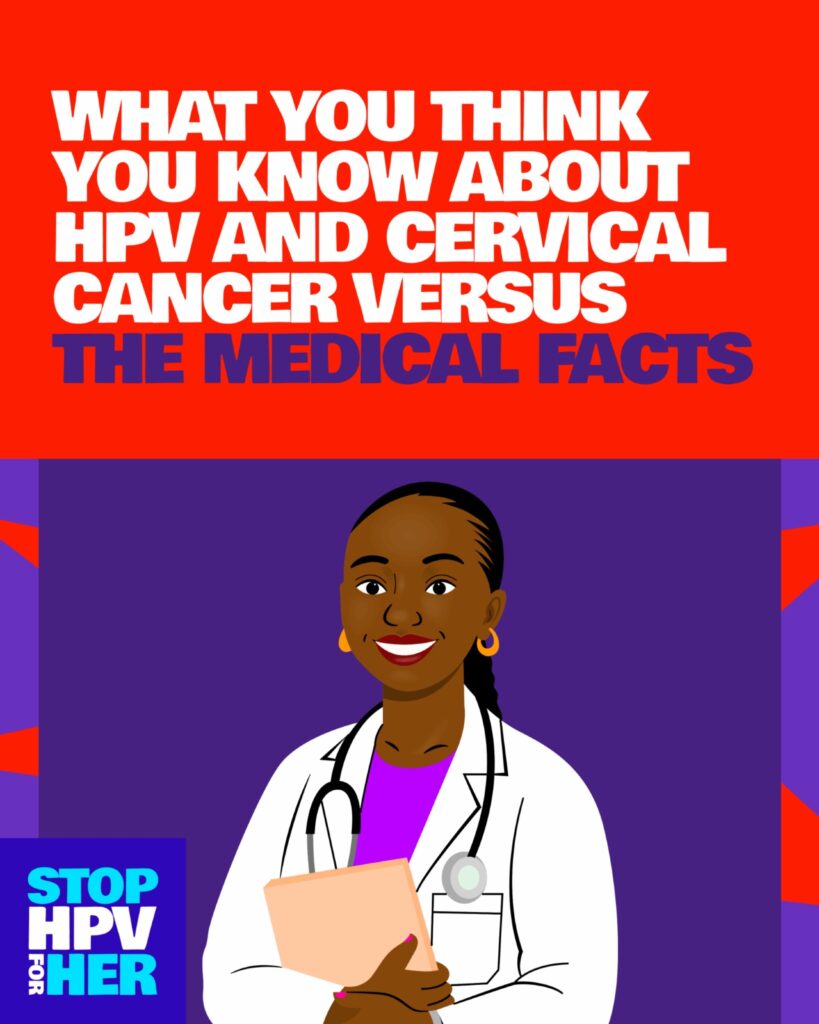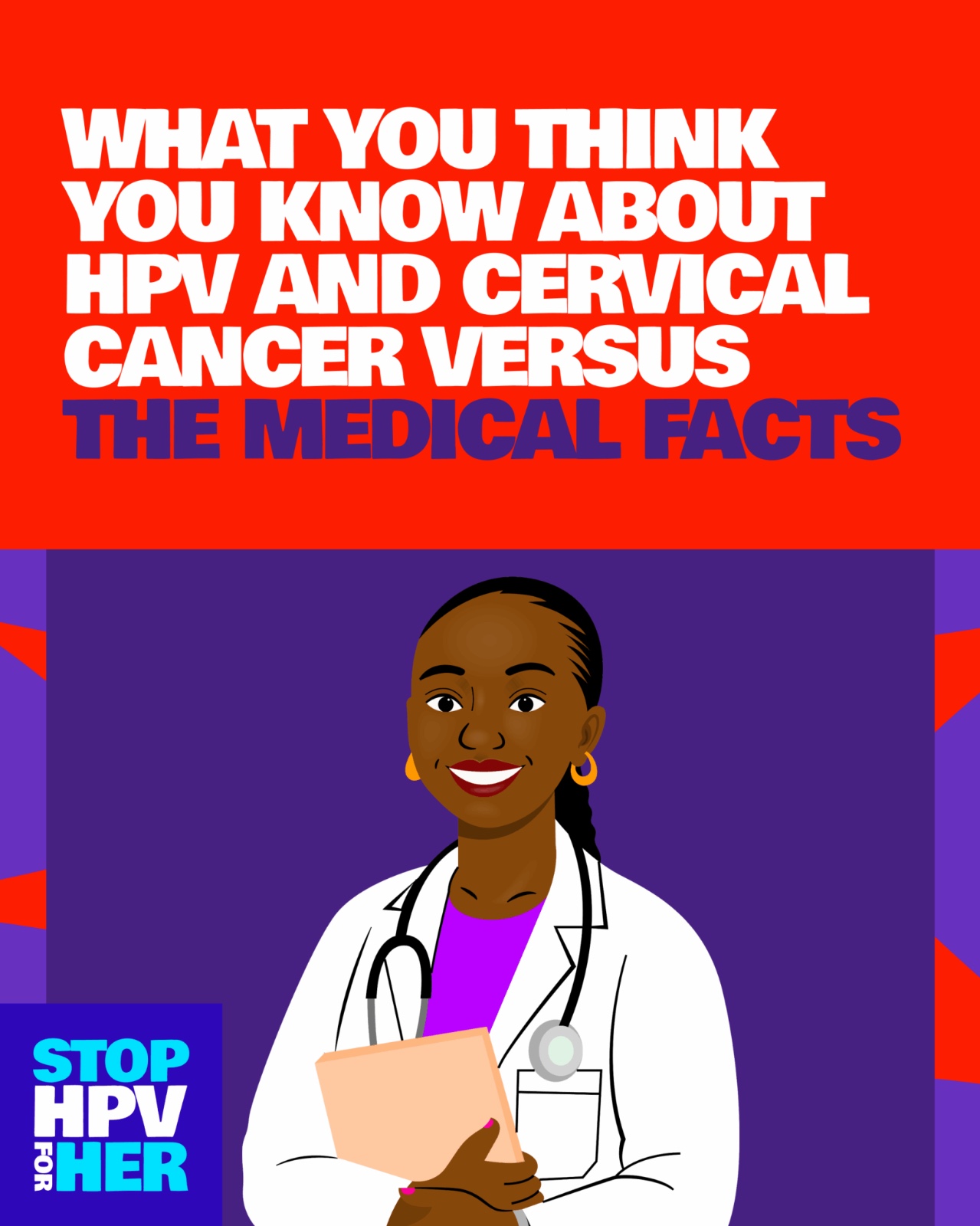It’s a scary truth: HPV myths are everywhere, and they’re keeping people misinformed. Misinformation keeps our women and girls unprotected and vulnerable to high-risk strains of HPV and then cervical cancer. It also shames women into silence.
With the #StopHPVForHer campaign, we’re cutting through the noise with facts. The truth is, cervical cancer is almost entirely preventable. We want to put that power back into your hands. What matters is getting the facts right and having accurate information, accessible vaccination, and regular screening.

Below, we tackle the biggest myths about HPV, cervical cancer, and prevention. We’ve also compiled answers to the most frequently asked questions about the HPV vaccine, because you deserve clear answers to protect your daughter and yourself too.
The Human Papillomavirus (HPV)
Only people who are promiscuous get HPV
False. HPV is the most common sexually transmitted infection (STI). Most sexually active people will get HPV at some point, even those in monogamous relationships.
HPV is rare
False. It is so common that nearly all sexually active men and women will get at least one type of HPV during their lives.
If I have HPV, I will definitely develop cancer
False. In 9 out of 10 cases, the body’s immune system clears the HPV infection naturally within two years. Cancer only occurs when a high-risk HPV infection persists.
HPV only affects women
False. HPV affects men as well, causing anal, penile, throat, and head/neck cancers, and genital warts.
You can only get HPV through penetrative sex
False. HPV is spread through skin-to-skin contact, often during intimate contact, not just intercourse.
Condoms prevent HPV transmission
Partially true, but misleading. Condoms can lower the risk, but they don’t cover all genital skin, so HPV transmission is still possible.
HPV is the same as HIV or Herpes
False. HPV is a different virus. Unlike HIV, most HPV infections are harmless and clear up on their own.
The HPV vaccine is only for teenagers
False. While most effective when given early (9-14), the vaccine is recommended for individuals up to age 26 who haven’t been vaccinated, and some adults up to 45 may decide to get it after consulting their doctor. Please consult your doctor for medical advice.
If I have warts, I will get cancer
False. Genital warts are caused by low-risk types of HPV (usually types 6 and 11), which do not cause cervical cancer.
HPV only affects older people
False. Research from the USA shows that HPV infection rates are highest among young adults and teenagers.
I have to have symptoms to have HPV
False. HPV is often called the “silent infection” because most people with the virus have no signs or symptoms and never know they have it.
If my daughter gets the vaccine, she will become promiscuous
False. Studies globally have shown no link between receiving the HPV vaccine and an increase in sexual activity or risk-taking behavior in adolescents.
The vaccine is not safe; it causes serious side effects
False. Research from global health organisations such as the World Health Organisation (WHO) confirms that the HPV vaccine has been rigorously tested and is proven to be safe and highly effective. Data shows that serious side effects are rare. The most common side effects are mild and short-term, like soreness or redness at the injection site.
If I’m already sexually active, the vaccine won’t work
False. Even if you’ve been exposed to one type of HPV, the vaccine can still protect you against other types you haven’t contracted yet. Consult with your doctor for medical advice and screening.
Only women who have had many partners need the vaccine
False. The vaccine protects against low and high-risk HPV types, and even a person with only one partner is at risk of exposure. The vaccine also protects against low risk HPV types that cause genital warts.
I can get tested for HPV with a blood test
False. The HPV test for cancer screening uses a swab of cervical cells. There is no standard blood test for HPV.
Once I clear HPV, I am immune forever
False. While your body can clear an infection, it does not make you immune to contracting HPV in the future.
HPV is preventable by using antibiotics
False. HPV is a virus, and antibiotics are ineffective against it. Vaccination is the primary prevention tool.
My daughter is too young to think about HPV
False. Health experts have selected ages 9-14 are the optimal time for vaccination because it targets protection before any potential exposure and research suggests a stronger immune response.
If I have a new partner, I need an HPV test right away
False. Routine HPV screening is only done as part of cervical cancer screening, typically starting from the age of 21 to 65. It’s once every 3 years if you do the Pap smear VIA or VILI, and once every 5 years if you do the HPV DNA testing.
Cervical Cancer
Cervical cancer is hereditary
False. Cervical cancer is primarily caused by persistent high-risk type HPV infection, not genetics.
Cervical cancer is always a death sentence
False. Cervical cancer is one of the most preventable and curable cancers if detected and treated early.
Once I’m vaccinated, I never need screening
False. The vaccine protects against the most common high-risk types, but regular screenings (Pap smears and HPV tests) are still necessary.
Cervical cancer is the same as uterine cancer
False. Cervical cancer starts in the cervix (the lower part of the uterus); uterine cancer starts in the main body of the uterus (endometrium).
The only symptom of cervical cancer is abnormal bleeding
False. While abnormal bleeding is common, other symptoms can include pelvic pain, pain during sex, or unusual discharge.
I am too old to worry about cervical cancer
False. While the risk is present in younger women, most cervical cancer diagnoses occur in women over the age of 40.
Cervical cancer is caused by stress or poor diet
False. While lifestyle factors affect overall health, the direct cause of nearly all cervical cancers is persistent infection with high-risk HPV.
If my Pap smear is normal, I don’t need another for many years
False. Screening frequency varies, but even with a normal Pap smear, the next one is usually recommended in 3 to 5 years, not decades later. Pap smear and VIA is every 3 years. HPV DNA every 5 years.
Cervical cancer is caused by poor hygiene
False. Cervical cancer is primarily caused by a virus (HPV), not by poor hygiene.
I had a hysterectomy, so I can’t get cervical cancer
Depends. If the hysterectomy removed the cervix (total hysterectomy), the risk is extremely low. If the cervix was left (supracervical hysterectomy), the risk remains.
Having babies protects against cervical cancer
False. Having multiple full-term pregnancies is actually linked to a slightly increased risk due to hormonal changes, though screenings remain the most critical factor.
Treatment for cervical cancer always means the removal of the uterus
False. Early-stage cancer can often be treated with localized procedures (like a LEEP or cone biopsy), which preserves fertility.
If I test positive for HPV, I need immediate cancer treatment
False. An HPV positive result means you need close monitoring. Treatment is only for precancerous or cancerous changes, not the virus itself.
Cervical cancer develops quickly
False. It generally takes 10 to 15 years for abnormal cells to develop into invasive cervical cancer. This long window is why screening works so well.
Herbal treatments can cure cervical cancer
False. There is no scientific evidence that herbal treatments cure cervical cancer. Standard treatment (surgery, radiation, chemotherapy) is required.
Only women who have had multiple partners are at risk
False. Since HPV is so common, a woman can be at risk even if she has only had one partner who was previously exposed.
Having an abnormal smear means I have cancer
False. Abnormal smears most commonly indicate mild changes (dysplasia) that can often be monitored or easily treated before they become cancer.
If my HPV test is negative, I’ll never get cancer
False. While the risk is extremely low, no test is 100% perfect, and you still need to adhere to the recommended screening schedule.
Only women who are married get cervical cancer
False. Marital status is irrelevant. Risk is based on HPV exposure, which can happen to any person who engages in intimate skin-to-skin contact – even without penetration or intercourse.
Pap Smears
Pap smears are painful
False. Most women experience only mild discomfort or pressure. The procedure is very quick, usually taking less than a minute. It can be painful for some women who have certain conditions but your doctor knows how to help you through this.
I need a Pap smear every year
False. Current guidelines for most women recommend a screening (Pap or HPV co-test) every 3 to 5 years if previous results were normal.
Pap smears detect all gynecological cancers
False. A Pap smear is specifically for cervical cancer screening. It does not screen for ovarian, uterine, or other cancers.
The HPV test and the Pap smear are the same thing
False. A Pap smear looks for abnormal cells (cytology). The HPV test looks for the presence of the high-risk virus itself (DNA).
If I don’t have health insurance, I can’t get screened
False. Some non-profit organisations and public health programmes offer free or subsidised screenings in Nigeria. Crucially, the HPV vaccine is provided free of charge by the Nigerian government for girls aged 9–14 at public health centres nationwide.
Once I hit menopause, I no longer need screenings
False. Cervical cancer can still develop after menopause, and women should continue screening until age 65 or 70 if their recent tests have been consistently negative.
I only need a Pap smear if I’m planning to get pregnant
False. Screening is a routine preventative health measure for all women within the recommended age group, regardless of pregnancy plans.
Screening is only necessary if I suspect I have an STI
False. Screening is a preventative measure for cancer, done even when you are perfectly healthy.
I can get a Pap smear during my menstrual period
Discouraged. It’s usually best to schedule your Pap smear when you are not menstruating, as blood can interfere with the cell sample reading.
The doctor needs to cut me to perform a Pap smear
False. A Pap smear involves a gentle swab to collect surface cells from the cervix; no cutting is involved.
I don’t need a Pap smear if I am a virgin
Generally true, but discuss with the doctor. Risk is very low without sexual activity, but if you have engaged in any intimate skin-to-skin contact, discussion with a doctor is advised.
If my Pap smear is abnormal, I need surgery immediately
False. An abnormal result usually leads to a follow-up test called a colposcopy to confirm the extent of the abnormality before any treatment (like LEEP) is considered.
I can screen myself for cervical cancer at home
True. Home testing for HPV DNA is a thing and if you do your home testing for HPV DNA, you don’t need to go to the hospital for a Pap smear, except if HPV is detected. If you choose to do a home test, ensure you take the sample to the hospital for a DNA analysis.
Pap smears are too expensive for the average Nigerian woman
False. While cost is a factor, efforts by the government and NGOs are making screening increasingly accessible and affordable through campaigns and subsidized programs.
The Pap smear will tell me if I have HPV
Not directly. A Pap smear looks for cell changes. An HPV test is a separate test done alongside or instead of the Pap smear to look for the virus.
I don’t need a Pap smear if I’m pregnant
False. If you are due for screening, it is generally safe and recommended to have a Pap smear during the first or second trimester of pregnancy. It’s best done postpartum but you can do it while pregnant but there are risks.
Once I start screening, I must continue for the rest of my life
False. Most guidelines recommend stopping routine screening between ages 65 if your recent results have been consistently normal.
Having a cervical infection means my Pap smear will be abnormal
False. Infections (like yeast or bacterial vaginitis) may affect the sample quality but do not directly cause the precancerous cell changes a Pap smear is looking for.
Screening is a waste of time since cervical cancer is treatable anyway.
False. Screening helps to detect the abnormal cells and helps to know when and where to treat. It’s less expensive, has lower side effects and treatment outcome is almost 100 percent.
Getting a Pap smear will make me lose my virginity
False. A Pap smear is a medical procedure. Medical experts say it may stretch the hymen but does not constitute losing one’s virginity, which is a cultural and personal definition.
It is important to consult with your doctor and also make a decision that aligns with your personal values and beliefs.









Leave a Reply